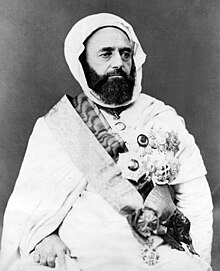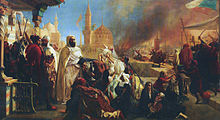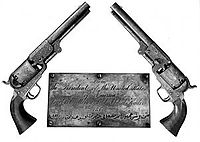| Revision as of 04:00, 26 June 2012 editOmar-Toons (talk | contribs)3,267 editsNo edit summary← Previous edit | Revision as of 15:42, 26 June 2012 edit undoDzlinker (talk | contribs)Extended confirmed users4,299 edits see tpNext edit → | ||
| Line 17: | Line 17: | ||
| '''Abd El-Kader ibn Muhieddine''' (6 September 1808 near ] – 26 May 1883 ]), ({{lang-ar|عبد القادر ابن محيي الدين}} ''{{transl|ar|DIN|ʿAbd al-Qādir ibn Muḥyiddīn}}'') known as '''{{transl|ar|DIN|Emīr ʿAbd al-Qādir}}''' or {{transl|ar|DIN|ʿAbd al-Qādir al-Jazāʾirī}}) was an ]n ]ic scholar, ], political and military leader who led a struggle against the ] in the mid-nineteenth century, for which he is seen by some Algerians as the "modern ]"<ref></ref> and a ]. | '''Abd El-Kader ibn Muhieddine''' (6 September 1808 near ] – 26 May 1883 ]), ({{lang-ar|عبد القادر ابن محيي الدين}} ''{{transl|ar|DIN|ʿAbd al-Qādir ibn Muḥyiddīn}}'') known as '''{{transl|ar|DIN|Emīr ʿAbd al-Qādir}}''' or {{transl|ar|DIN|ʿAbd al-Qādir al-Jazāʾirī}}) was an ]n ]ic scholar, ], political and military leader who led a struggle against the ] in the mid-nineteenth century, for which he is seen by some Algerians as the "modern ]"<ref></ref> and a ]. | ||
| In France, after having been considered as an enemy during the first half of the 19th century, he became considered as a "friend of France" after having intervened in favor of persecuted Christians in Syria in 1860<ref>" refusent de reconnaitre le rôle d'ami de la France joué par l'émir à Damas sous le Second Empire. En 1860, en effet, Abd-el-Kader intervint pour protéger les chrétiens lors des massacres de Syrie, ce qui lui valut d'être fait grand-croix de la Légion d'honneur par Napoléon III", ],''La Guerre d'Algérie par les documents, Volume 2'', Service historique de l'Armée de terre, 1998, p.174 (ISBN:2863231138)</ref><ref>"Notre ancien adversaire en Algérie était devenu un loyal ami de la France, et personne n'ignore que son concours nous a été précieux dans les circonstances difficiles" in ''Archives diplomatiques: recueil mensuel de diplomatie, d'histoire et de droit international, Numéros 3 à 4'', Amyot, 1877, p.384</ref><ref>Mouloud Haddad, « Sur les pas d’Abd el-Kader : la hijra des Algériens en Syrie au XIXe siècle », in Ahmed Bouyerdene, Éric Geoffroy et Setty G. Simon-Khedis (dir.), Abd el-Kader, un spirituel dans la modernité, Damas, Presses de l'Ifpo (« Études médiévales, modernes et arabes », no PIFD 237), 2012, , mis en ligne le 04 mai 2012, Consulté le 26 juin 2012. URL : http://ifpo.revues.org/1832</ref><ref>John W. Kiser, ''Commander of the Faithful, the Life and Times of Emir Abd El-Kader: A Story of True Jihad'', Monkfish Book Publishing Company, 2008 </ref><ref>N. Achrati, ''Following the Leader: A History and Evolution of the Amir ‘Abd al-Qadir al-Jazairi as Symbol'',The Journal of North African Studies Volume 12, Issue 2, 2007 : "The French continued to pay his pension and monitor his activities, and 'Abd al-Qadir | |||
| remained a self-declared 'friend of France' until his death in 1883." </ref><ref>Louis Lataillade, ''Abd el-Kader, adversaire et ami de la France'', Pygmalion, 1984, ISBN:2857041705</ref><ref>Herbert Ingram Priestley, ''France Overseas: A Study of Modern Imperialism (1938)'', American Historical Association Publications, Routledge, 1967 (ISBN:0714610240), : " transferred to Damascus by Napoleon III. There he became a friend of France, saving twelve thousand Christians from the Turks at the time of the massacres in Damascus, and refused to ally himself with the insurgents in Algeria in 1870."</ref>. | |||
| == Name == | == Name == | ||
Revision as of 15:42, 26 June 2012
For the song, see Abdel Kader (song). For the Palestinian nationalist, see Abd al-Qadir al-Husayni.| Abd al-Qadir al-Jaza'iri عـبـد الـقـادر الـجـزائـري | |
|---|---|
 | |
| Born | Abd el-Kader ben Muhieddine September 6 , 1808 Mascara, Algiers Eyalet, Ottoman Empire |
| Died | May 26, 1883(1883-05-26) (aged 74) Damascus, Damascus Vilayet, Ottoman Empire |
Abd El-Kader ibn Muhieddine (6 September 1808 near Mascara – 26 May 1883 Damascus), (Template:Lang-ar ʿAbd al-Qādir ibn Muḥyiddīn) known as Emīr ʿAbd al-Qādir or ʿAbd al-Qādir al-Jazāʾirī) was an Algerian Islamic scholar, Sufi, political and military leader who led a struggle against the French invasion in the mid-nineteenth century, for which he is seen by some Algerians as the "modern Jugurtha" and a national hero.
Name
Abd al-Qādir is often referred to only as El Amir Abdelkader, since al-Jazā'iri simply means "the Algerian". His name can be variously transliterated from its Arabic spelling as Abd al-Kadir, Abdel Kader, Abdelkader, and other variant spellings. He is also often given the titles amir, prince, and shaykh or sheik.
Early years
Abd al-Qādir was born near the town of Mascara near Oran, in 1808. His father, Muhyi al-Din al-Hasani, was a shaykh in the Qadiri sufi order of Islam. He was a Banu Ifran Berber and claimed descendance from Muhammad.
In his childhood he memorized the Qur'an and was trained in horsemanship, theology and linguistics, and received an education far better than that of his peers. In 1825, he set out for the Muslim pilgrimage, hajj, with his father. While in Mecca, he encountered Imam Shamil; the two spoke at length on different topics. He also traveled to Damascus and Baghdad, and visited the graves of noted Muslims, such as Shaykh Ibn Arabi and Sidi Abd-el-Kader El Jilani named also El-Jilali in Algeria. This experience cemented his religious enthusiasm. On his way back to Algeria, he was impressed by the reforms carried out by Muhammad Ali in Egypt. He returned to his homeland a few months before the arrival of the French.
French invasion and resistance
In 1830, Algeria was invaded by France; French colonial domination over Algeria supplanted what had been domination in name only by the Ottoman Empire. Within two years, Abd al-Qādir was made an amir and with the loyalty of a number of tribes began a rebellion against the French. He was effective at using guerrilla warfare and for a decade, up until 1842, scored many victories. He often signed tactical truces with the French, but these did not last. His power base was in the western part of Algeria, where he was successful in uniting the tribes against the French. He was noted for his chivalry; on one occasion he released his French captives simply because he had insufficient food to feed them. Throughout this period Abd al-Qādir demonstrated political and military leadership, and acted as a capable administrator and a persuasive orator. His fervent faith in the doctrines of Islam was unquestioned.
Until the beginning of 1842 the struggle went in his favor; however, the resistance was put down by Marshal Bugeaud. In 1837, Abd al-Qādir signed the Treaty of Tafna with Bugeaud, in which he recognized France's sovereignty in Oran and Algiers, while France recognized his control over the remaining two-thirds of the country, mainly the interior. When French troops marched through a mountain pass in territory Abd al-Qādir claimed as his in open defiance of that claim, he renewed the resistance on October 15, 1839.
Abd Al-Qādir was ultimately forced to surrender. The French armies grew large, and brutally suppressed the native population and practiced a scorched-earth policy. Abd Al-Qādir's failure to get support from eastern tribes, apart from the Berbers of western Kabylie, also contributed to the quelling of the rebellion. On December 21, 1847, after being denied refuge in Morocco because of French diplomatic and military pressure on its leaders, Abd al-Qādir surrendered to General Louis de Lamoricière in exchange for the promise that he would be allowed to go to Alexandria or Acre. Two days later, his surrender was made official to the French Governor-General of Algeria, Henri d'Orléans, duc d'Aumale. The French government refused to honour Lamoricière's promise and Abd Al-Qādir was exiled to France.
In 1843 Marshal Soult declared that Abd-el- Kader was one of the three great men then living ; the two others, Imam Shamil and Muhammad Ali of Egypt also being Muslims.
Life in exile


Al-Qādir and his family were detained in France, first at Toulon, then at Pau, and in November 1848 they were transferred to the château of Amboise. There he remained until October 1852, when he was released by Napoléon III and given an annual pension of 200 000 francs on taking an oath never again to disturb Algeria. He then took up residence in Bursa, today's Turkey, moving in 1855 to Amara District in Damascus. He devoted himself anew to theology and philosophy, and composed a philosophical treatise, of which a French translation was published in 1858 under the title of Rappel à l'intelligent. Avis à l'indifférent. He also wrote a book on the Arabian horse.
While in Damascus he befriended Jane Digby and Richard and Isabel Burton. In July 1860, conflict between the Druze and Maronites of Mount Lebanon spread to Damascus, and local Druze attacked the Christian quarter, killing over 3,000 persons. Abd al-Qādir and his personal guard saved large numbers of Christians, bringing them to safety in his house and in the citadel. For this action the French government increased his pension to 4000 Louis and bestowed on him the Grand Cross of the Légion d'honneur. He was also honoured by Abraham Lincoln for this gesture towards Christians with several guns that are now on display in the Algiers museum.
In June 1864, Al-Qādir became a Freemason. In 1865 he visited Paris on the invitation of Napoléon III and was greeted with both official and popular respect. Abd Al-Qādir died in Damascus on 26 May 1883 and was buried near the great Sufi Ibn Arabi in Damascus.
See also
References
- Ernest Mercier, L'Algérie en 1880, éd. Challamel, Paris, 1880, p.36,p.40
- Chambers Biographical Dictionary, ISBN 0-550-18022-2, page 2
- P. Rozet, L’univers ou histoire et description de tous les peuples, p. 193
- Par Société languedocienne de géographie, Université de Montpellier. Institut de géographie, Centre national de la recherche scientifique (France) Publié par Secrétariat de la Société languedocienne de géographie, 1881. Notes sur l'article: v. 4, page 517
- Alexandre Bellemare, Abd-el-Kader sa vie politique et militaire', Hachette, 1863, p.4
- http://www.archive.org/stream/lifeofabdelkader00churrich#page/328/mode/2up
- http://www.archive.org/stream/freemasonryinho01morrgoog#page/n586/mode/2up
External links
- Abd Al-Kadir's Struggle For Truth
- Famous Quotes by Abd al-Qadir
- Emir Abdelkader collected news and commentary at The New York Times
 Texts on Wikisource:
Texts on Wikisource:
- Wood, James, ed. (1907). "Abd-el-Kadir". The Nuttall Encyclopædia. London and New York: Frederick Warne.
{{cite encyclopedia}}: Unknown parameter|first_letter=ignored (help) - Chisholm, Hugh, ed. (1911). Encyclopædia Britannica (11th ed.). Cambridge University Press.
{{cite encyclopedia}}: Missing or empty|title=(help) - Beach, Chandler B., ed. (1914). The New Student's Reference Work. Chicago: F. E. Compton and Co.
{{cite encyclopedia}}: Missing or empty|title=(help) - Reynolds, Francis J., ed. (1921). "Abd-el-Kader". Collier's New Encyclopedia. New York: P. F. Collier & Son Company.
- Wood, James, ed. (1907). "Abd-el-Kadir". The Nuttall Encyclopædia. London and New York: Frederick Warne.